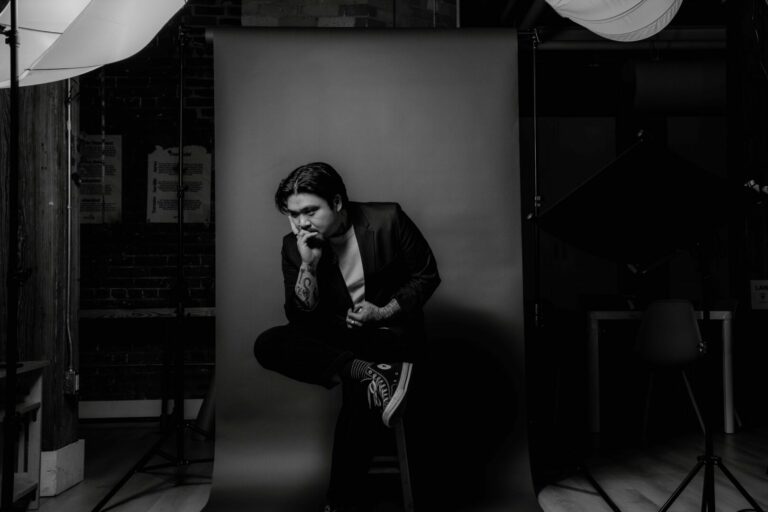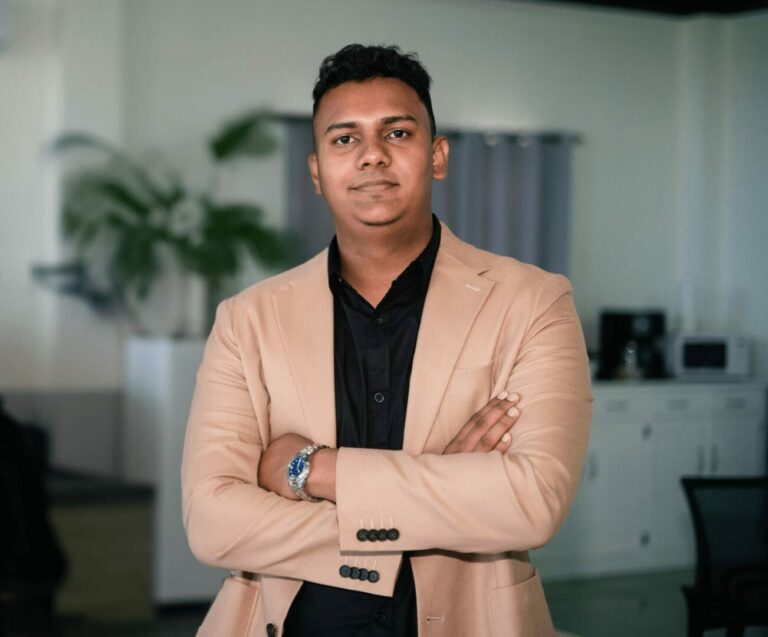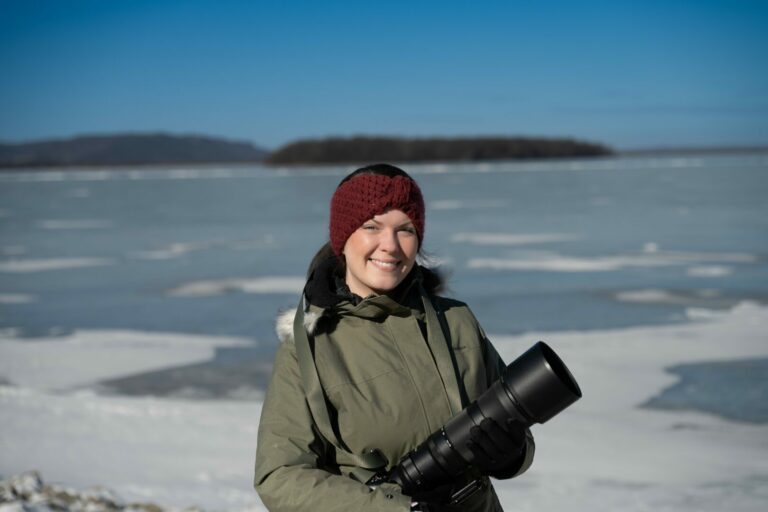We recently connected with Holly Edwards and have shared our conversation below.
Holly, so good to have you with us today. We’ve always been impressed with folks who have a very clear sense of purpose and so maybe we can jump right in and talk about how you found your purpose?
Growing up I was really unsure about what I wanted to do with my life.
At school, we were told to focus on something we liked or were good at. I did well at writing and mathematics, but I didn’t enjoy the process. I loved art, but it didn’t feel practical or meaningful enough in isolation. Focusing on a skill and finding a career to hone it wasn’t going to fulfil me – I needed to contribute something deeper, or at least try to.
I was lucky enough to go on holidays to Indonesia and Fiji regularly when I was young, and the people I saw there living in poverty stayed with me. I used to bring as many clothes as I could to give to the young girls in the villages. As I got older and learnt that about how many people in Asia were exploited for cheap labour by big companies, it disgusted me. I also loved animals, and decided to stop eating them in my early teen years (much to my family’s dismay). I learnt more and more about the terrible animal agriculture industry over the years, and became passionate about fighting against animal abuse.
I considered going into a journalism, communications or activism career, but writing and campaigning alone weren’t going to satisfy me – I wanted to create something. I eventually found myself studying business at university without a clear direction. I chose marketing as my major and quickly discovered a love for design, especially digital and web design. This blend of art and technology fascinated me, allowing me to express my creativity while also being analytical and solving problems.
My purpose began to take shape when I worked on a final design project – I wanted to solve the problem that there was no sustainable alternative to leather.
I hadn’t bought leather in a long time, because I think it’s devastating that humans have taken one of the greatest joys of our planet – it’s marvellous creatures – and turned them into products. It’s baffling to think about how humans kill more than 200 million land animals for food per day. That’s not counting sea creatures, animals killed indirectly by habitat destruction, or animals killed specifically for other industries – like fashion.
Cattle ranching, responsible for 80% of deforestation in the Amazon rainforest, is a major driver of climate change, with methane emissions from cattle and extensive use of water and chemicals for feed. Interestingly, while similar materials like fur have been globally condemned, leather has maintained its image as a coveted luxury product. Apart from greenwashing by the leather industry – I blame the lack of a high quality, eco-friendly alternative.
Labour exploitation in the leather industry is also a massively concerning issue, particularly in developing countries where much of the world’s leather is produced. Workers, including children, are often subjected to hazardous conditions, exposed to toxic chemicals used in the tanning process, and receive inadequate pay and benefits. Lack of enforcement of labour laws and regulations allows for long working hours and unsafe environments. This exploitation is driven by the global demand for cheap leather goods, leading to a race to the bottom in terms of labour rights and working conditions.
On the other hand, faux leather, or “vegan leather,” poses its own problems. Although free from animal exploitation, its production involves significant water, energy, and chemicals, with materials like PVC and polyurethane derived from petroleum fossil fuels. Recent plant-based faux leathers still contain plastics, making them an imperfect solution to the problems associated with traditional leather.
I realised that this was an industry that I could use my skillset to disrupt. I could fight for animal rights, the environment and ethical manufacturing my creating my own sustainable vegan handbag brand that offered something better. It wasn’t going to happen overnight – the global leather goods market was worth an estimated USD 420 billion in 2022 – but independent designers needed to spark the change.
My first attempt at university was a very basic clutch bag, hand stitched and made from cork oak tree bark from Portugal. Over the years, I worked marketing jobs and refined my idea on the side. With no background knowledge in product development or manufacturing, it was a steep learning curve. It was very difficult to develop a high end looking plastic-free vegan leather handbag and I went through various iterations of the brand. Lots of ethically certified manufacturers wouldn’t work with me because my minimum orders quantities and budget were too low. Some materials I used weren’t durable enough or looked too ‘eco’.
When I did find the right manufacturer, a small family-owned, female-run workshop in Portugal, and the right material, the first completely plastic-free vegan leather, made in a renewable energy powered factory in the USA, my costs were incredibly high. I felt imposter syndrome about the price that I would need to charge for the end product. Despite the fact that famous designer labels all over the world, who were offering nothing ethical, new or innovative, charged thousands for an accessory – who was I to charge hundreds? I wondered whether I was on the right path.
Eventually I bit the bullet, went with it and launched my brand. It’s only early days but I’m proud that I’m trying. I don’t know if I will succeed, but it feels inspiring to work on something that I care about deeply and that challenges lots of different parts of my brain.
I have other big passions in life – like exploring the planet, learning about the universe and love.
Speaking career wise, I think the key to finding purposeful work is finding a way to marry your technical skillset and hobbies with a problem that the world needs fixed. In my opinion, figuring out how to help others through your unique abilities is the most fulfilling route you can take. But don’t be stressed or hasty. You will likely have to work boring or uninspiring jobs whilst you figure it out, both mentally and financially. Have patience with yourself. It sounds cliché, but you’ll learn a lot along the way.
Appreciate the insights and wisdom. Before we dig deeper and ask you about the skills that matter and more, maybe you can tell our readers about yourself?
My name’s Holly Edwards, I’m a 29 year old designer from the Gold Coast, Australia, and I recently launched my brand, Lost Woods.
Lost Woods is a sustainable vegan handbag label, handmade in Portugal from MIRUM®, the first 100% plastic free vegan leather in the world.
Cattle ranching for beef and leather is the biggest driver of deforestation on the planet – my brand name pays homage to all of the forests and wildlife lost to leather.
It’s my mission to redefine luxury by creating sleek and sexy bags that are cruelty-free, ethically made and sustainable. I’ve worked hard to ensure that Lost Woods’ collection doesn’t look ‘eco’ – instead, our handbags, backpacks and wallets are minimal and chic, with buttery soft and unique structured shapes, gold and silver heavy hardware and edgy chains.
The hero material of my launch collection, MIRUM®, is the high-quality, beautiful, durable vegan leather alternative that the world has been waiting for. I used black, full leather grain textured MIRUM® for the first collection, and are planning to launch new colours like tan, olive and electric blue if the business grows. Because the material is completely natural, all of the colours come from natural pigments, for example, black from charcoal and blue from lapis lazuli stone.
MIRUM® was invented by a team of incredibly talented, award-winning chemists. It’s is made in a renewable energy powered factory in the USA, and is up to 10 times less greenhouse gas emitting than conventional animal or plastic leather. It’s incredibly premium feeling and hard-wearing – it meets the top automotive industry standards and is already being used by big names like BMW. It’s is made from 47% natural tree rubber, 26% natural fibres and fillers, 27% plant oils and waxes and is backed with natural cotton. Did you know that natural rubber comes from tree sap? Sustainably managed rubber farms can actually result in net-negative carbon emissions, because of the carbon that the trees absorb from the atmosphere, which is pretty amazing.
After years of searching for the right manufacturer, I decided on a leather making workshop near Porto, in Portugal. Established in 1975, the makers are masters at their craft. Family-owned and female-run, some employees have been at the business for over 40 years. I have a close relationship with the factory, who employ a team of 20 talented makers. I would count my project manager, David, as a friend. We share life and family updates regularly, and I’m proud to support another small business where I know the team personally.
I’m only in the very early days of my business, but it’s my goal to disrupt the billion dollar leather industry. I want to open the public’s eyes to the truth of the leather industry. It’s not a luxury product, or a natural waste product. It’s an industry that is steadily ruining the environment through deforestation and pollution, that exploits animals and people. Fashion doesn’t have to be so depressing and dirty. It can be beautiful and beneficial for all involved, if we only dare to push the boundaries, support innovation, and pay makers more for their art.
Lost Woods’ first collection is now live, and you can browse our tote bags, baguette bags, crossbody bags, backpacks, card holders and more online – we offer free shipping worldwide.
There is so much advice out there about all the different skills and qualities folks need to develop in order to succeed in today’s highly competitive environment and often it can feel overwhelming. So, if we had to break it down to just the three that matter most, which three skills or qualities would you focus on?
1) A hunger for knowledge.
No matter how much you know, you could always know more. You could always widen your skillset and open your mind to new ideas. I think having this hunger to learn is so important for entrepreneurs, because you’ll have to keep learning everyday to evolve your business.
You’ll learn by doing, of course, but also studying, doing short courses online – or even YouTube videos and podcasts can be great.
Embracing that you barely know anything can be a real joy, rather than something that’s scary.
I found a lot of people in previous jobs would default to asking me how to do things – but I didn’t know either, I’d just look them up. Look everything up, find everything out. If you can feel inspired rather than intimidated by your knowledge gaps, it will change your whole outlook.
2) Developing self-confidence.
Ultimately, starting a business means backing your own ideas, and there is nothing more paralysing than self-doubt. It can be really overwhelming when you first start out, and you don’t know what you’re doing, but you’ll get better at it over time.
Something I found that really helped was working in other thriving small businesses. Working alongside founders I realised that yes, they were amazing people – but they were also just people, learning, growing and figuring things out day to day, and I could do that too.
3) Letting go of perfectionism.
Being a perfectionist can sometimes be a bottleneck. I grew up with this personality type, and am definitely still an offender, but I’ve learnt to let go more often and push work out faster.
Attention to detail is great, and essential for brands in the luxury space, like mine. The identity, website and product design must be beautiful to compete. But it’s never going to be perfect, and you’ll spend years wasting time fussing when you could be out in the marketplace learning and growing.
You will always have waves of anxiety and internal questioning over whether the decisions you’re making every day are the right ones, and whether you’re good enough, but you have to develop the ability to let the thoughts go, and just keep plugging on. Doing something to grow your business is better than sitting there worrying and doing nothing. Whilst strategizing is good, over-strategizing can be paralyzing. Sometimes you just have to throw some ideas at the wall and see what sticks.
Do you think it’s better to go all in on our strengths or to try to be more well-rounded by investing effort on improving areas you aren’t as strong in?
I think there needs to be balance, and the cost/benefit ratio of each skill needs to be weighed.
Your core focus day to day should be where you can offer the most value. For example, my professional background is in marketing and design, so along with managing the business, I provide those technical functions, and I will continue to do so whilst the business is small.
Tasks that would take a lot of time and money for you to master, and that need to be of a very high quality for your company – you should outsource. For example, amazing photography is an essential aspect for a luxury fashion brand, and I don’t have time to master it, so I pay a professional for that. On the other hand, if you’re business is something homely and low-key, perhaps it is worth your time to develop some content creation skills.
To manage a business and to strategize effectively I think you need at least a basic understanding of all areas of your company. From experience working at other companies, I know what I want from a photoshoot. From my web design experience and basic coding abilities, I know what I want from a developer, what to ask for, and how to check their work.
For my website I stay abreast of Shopify updates and I can customise my theme’s HTML and CSS to implement design changes quickly, but it wouldn’t be worth my time to spend a year learning Javascript, when I could be developing new products and gaining new exposure opportunities for the company.
Learn enough to know what you need from others, but don’t waste time getting technically specific with any function that isn’t critical for the growth of the business.
Contact Info:
- Website: https://lostwoodsvegan.com/
- Instagram: https://www.instagram.com/lostwoodsvegan/
- Facebook: https://facebook.com/lostwoodsvegan
- Twitter: https://twitter.com/lostwoodsvegan
- Youtube: https://www.youtube.com/@lostwoodsvegan








Image Credits
Chris Dwyer Photo




